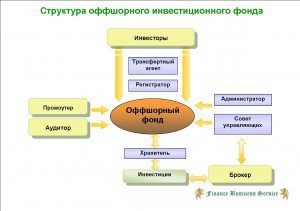

Entrepreneurs with successful experience of investing abroad their own funds are very often interested in investment operations with assets of the third parties. Pooling investors usually allows investing money at much more favorable terms. This is the main reason for the existence of investment funds.
Investment fund is a subject of law, which is different from all other entities, known in the common law that it is not legal personification of a person or group (as in the case of a corporation); it is rather a subject that has no owners (shareholders, members or partners) and traditionally has a specific target orientation – profit group of individuals.
Activities of the Fund are subject to regulation by the State where the fund is registered. That is why it is advantageous to register such fund in the offshore zones. In these countries, the regulation comes down to ensure that the fund must obtain permission from the authorities on their activities and submit timely reports on the statutory form. The investment activity of the fund itself is practically not regulated, which makes it possible to invest in a wide variety of instruments.
Investment funds are divided into two classes: “open» (Open-End Funds) and “closed» (Closed-End Funds). The main difference between them lies in how the funds are organized in terms of pricing of fund shares (investment certificates).
“Open” Funds are issuing and buying back their stocks, shares on demand, i.e. when an investor puts his money or repays the fund’s securities. The number of depositors of the Fund is unlimited. “Closed” funds, like public companies, produce a certain number of stocks, shares issued in the course of the subscription, and then they can be traded on an exchange like any other stock. The value of shares of the “closed” fund is determined by investors’ demand for its securities.
Also, additionally the following classification is used:
Private Fund – which has no owner, but there are people who controls its operations. The number of investors in the fund is typically limited and shares are offered to a certain number of individuals. Professional fund – is a fund whose shares are available only to professional investors. Professional investor herein means a person investing in similar assets professionally, or just wealthy individuals (capital of at least $ 1 million), who agreed to be equal to professionals. Public fund – is a fund that can offer its shares to an unlimited number of investors. Accordingly, satisfy more stringent requirements are applied, than to other types of funds.All the funds have to be founded in a legal form. It may be partnership, unit trusts, the company. Most of the funds are founded in the form of the company. And for the offshore jurisdictions this means that it is a company registered with the non-resident status, and is exempted from taxes, except for fixed annual fees.
The structure of the fund is quite specific. As in any company the fund has a board of directors that makes decisions of a strategic nature. But apart from this the fund has a specific organizational structure. It implies:
- Chairman of the board (Manager) is a licensed individual or legal person which determines the Fund’s investment strategy and investment decisions.
- Administrator is a licensed individual or legal person who is the registered agent, maintains a registry of shares, maintains contacts with shareholders, responsible for accounting and calculates the net asset value.
- Custodian or depositary is an individual or legal person who holds the assets of the fund (which usually are securities and cash), carries out transactions with them, collects dividends on these securities and provides relevant financial information to the administrator.
- Auditor checks fund accounts (for private and professional funds it is not mandatory, but desirable.)
- Investment Advisor is an individual or legal person who provides investment advices to the manager. This may be the founder of the fund, he can also be at the Board of Directors. This position is not mandatory.
In general, investment funds are used for the pooling of investors, which usually allows investing money at much more favorable terms.
But the funds are also established for specific tasks.One of them is the use of the fund for the confidential control and ownership of the company. Instead of registering the shares of corporations in their own name or to issue bearer shares issued on the stock fund. Thus, the meaning of using the fund as a shareholder of the corporation is to get rid of personal possessions (or by bearer shares) and transfer the property.
The fund can be used when opening corporate bank accounts or investment accounts without disclosing the identity of the beneficial owners of the corporation. With the presence of the fund it may be stated that this fund is the owner of the corporation. It is done to get rid of personal possessions in favor of a foreign entity whose owners are anonymous.
The fund can be used when transferring funds to offshore or receiving funds from offshore. The advantage in this case is the exemption from financial obligations related to charitable contributions (because some states levy a tax on donations and are more demanding to reporting).
Funds may not be engaged in the usual commercial activities as a corporation. Nevertheless, they may be engaged in commercial activities from time to time, if the income from such activities is used to achieve the objectives of the fund. For example, a private fund may be engaged in banking or investment activities, such as investment in bank deposits, stocks, bonds, mutual funds, options, money markets, etc., if the profits derived from such investments are intended to be for the beneficiaries of the Fund.